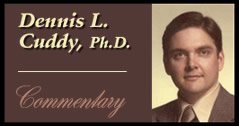Other
Cuddy
Articles:
Sept. 11:
Hold Government
Accountable
An
Economic Assault on
African-Americans and Others in The US
WHAT ARE WE DOING IN IRAQ?
PART 2
By
Dennis L. Cuddy, Ph.D.
January 29, 2007
NewsWithViews.com
In President Bush's January 23, 2007, State of the Union speech, he stated regarding American foreign policy that "our work in the world is also based on a timeless truth: to whom much is given, much is required." Perhaps he didn't identify this "timeless truth" as coming from Luke 12:48, because immediately after this truth, Luke 12:48 states: "And to whom men have committed much, of him they will ask the more." One of the things our soldiers will be asking President Bush is why have they been dying in Iraq for his failed policies there? And my question again in Part 2 of series is "What are we doing in Iraq?"
On NBC's "Meet the Press" Sunday morning, January 21, 2007, Senators John McCain and Ted Kennedy were guests, giving their opposing views on the solution for Iraq. The show could have been on ABC's "This Week" with George Stephanopoulus or CBS's "Face the Nation,", etc., and it was basically a repetition of generalities we have heard for the last 4 years since we have been in Iraq (longer than World War II). The point is that the guests, the hosts, and most Americans never get beyond surface concerns to the real problems involved.
For example, the Bush administration is now talking about a "new strategy" for Iraq, entailing a "surge" in U.S. troops there to give the Iraqi National Army time to be trained to take over the burden of providing security for its people. Sounds reasonable, doesn't it? But why has it taken 4 years to do this? Why were only about 6 professional trainers assigned this task shortly after the war began, and the number of professional training staff never even reached half of the 250 promised to Major-General Paul Eaton? In other words, why did we NOT want to train quickly an Iraqi National Army?
Could it be that if an Iraqi National Army were quickly trained and equipped, there would be no need for the huge American military bases being constructed there, facilitating the "more permanent role in Gulf regional security" desired by the Project for the New American Century (PNAC)? In addition to military considerations, is it possible that oil and gas have played a part in American policies concerning Iraq? According to Lutz Kleveman's THE NEW GREAT GAME: BLOOD AND OIL IN CENTRAL ASIA (2003), of the 15 American or British military bases in Iraq, Afghanistan, Pakistan, Saudi Arabia, Turkey, Georgia, Uzbekistan and Kyrgyzstan, eleven are near oil pipelines or planned oil or gas pipelines (the other 4 are near sea coasts). Is this just coincidental? One of the reasons proposed for Saddam Hussein's removal was concern about oil as expressed by an independent task force sponsored by the James A. Baker III Institute for Public Policy and the Council on Foreign Relations.
Various other reasons also have been offered for our not quickly training the Iraqi National Army and for not providing that army with the arms and equipment necessary to be an effective force. Two such other reasons are that the Iraqi National Army had been infiltrated by insurgents, and that such training for the Sunnis and Shiites would only allow them more efficiently to kill each other in what is largely a sectarian power struggle or civil war. But what has thus far been missing from the debate between Republicans and Democrats is "training for what?" Republicans advocate an increase in U.S. forces, but even Democrats talking about redeployment or reduction in forces still say their strategy is designed to force the Iraqis to be trained and bear the military burden more quickly. However, "trained for what" seems to be never explored.
A national army, like the U.S. Army, is trained for and tasked with defending our nation against external aggressors. For over a century, posse comitatus laws have prohibited the army from being used in civilian law enforcement. Yet, that is exactly what the U.S. is asking the Iraqi National Army to do. They aren't being trained to resist an invasion from the Syrian Army, for example, but to provide security WITHIN Iraq. That means Sunnis having to kill their fellow Sunnis and Shiites killing fellow Shiites.
How would you feel if President Bush or any other U.S. President ordered you as an American soldier to go into your home state and kill your neighbors who resisted any particular U.S. policy? Do you remember about a year ago when Iraqi soldiers were ordered to attack people of their own sectarian group in a town, and the soldiers instead ripped off their army uniforms? As I have written before about the sectarian nature of the problem in Iraq, it's as if Protestants in the U.S. were forced to live under Catholic religious law or vice versa.
Some American analysts counter that the Iraqis are only being asked to root out foreign insurgents, but as I have also explained before, the foreign insurgents are a very small contingent and are primarily being harbored by the minority Sunnis against majority Shiite retribution for what Saddam Hussein did to them. There is no isolated "Insurgent City" that can easily be identified and cleared.
Therefore, to attack the "insurgents" is really to attack the Sunnis. Do you think Sunni soldiers in the Iraqi National Army will do that? I doubt it ! Do you think Shiite soldiers in the Iraqi National Army would do that? Gladly ! But that would just further inflame sectarian violence, and make it seem that the U.S. was siding with Shiites in oppressing the Sunnis. This is not the way to create harmony among all Iraqis.
I could go on and on analyzing the problems in Iraq, but my main point here is that the President, nearly all of the Congressional Democrats and Republicans, nearly all of the major media pundits and talk show hosts, and nearly all Americans never seem to ask such simple questions as I have just posed, such as "training for what," and then following logically the consequences of their answers. That's why we have a mess in Iraq today.
|
Subscribe to the NewsWithViews Daily News Alerts! |
And as far as the power elite are concerned, could it be that what the U.S. is asking the Iraqi National Army to do is designed to set a precedent for the U.S. military being used against Americans inside the U.S., wiping out posse comitatus protections here? Think about it. For part 1 click below.
Click here for part -----> 1, 2,
� 2007 Dennis Cuddy - All Rights Reserved
Order Dennis Cuddy's new book "Cover-Up: Government Spin or Truth?"
Sign Up For Free E-Mail Alerts
E-Mails are used strictly for NWVs alerts, not for sale
Dennis Laurence Cuddy, historian and political analyst, received a Ph.D. from the University of North Carolina at Chapel Hill (major in American History, minor in political science). Dr. Cuddy has taught at the university level, has been a political and economic risk analyst for an international consulting firm, and has been a Senior Associate with the U.S. Department of Education.
Cuddy has also testified before members of Congress on behalf of the U.S. Department of Justice. Dr. Cuddy has authored or edited twenty books and booklets, and has written hundreds of articles appearing in newspapers around the nation, including The Washington Post, Los Angeles Times and USA Today. He has been a guest on numerous radio talk shows in various parts of the country, such as ABC Radio in New York City, and he has also been a guest on the national television programs USA Today and CBS's Nightwatch.
E-Mail: Not Available
A national army, like the U.S. Army, is trained for and tasked with defending our nation against external aggressors. For over a century, posse comitatus laws have prohibited the army from being used in civilian law enforcement.












